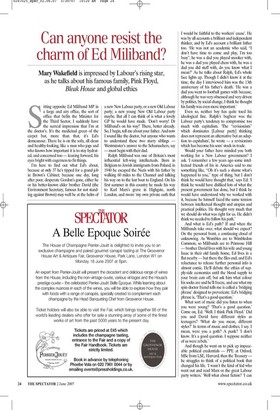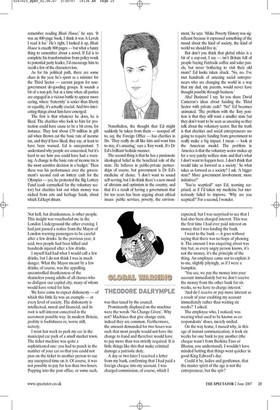Can anyone resist the charm of Ed Miliband?
Mary Wakefield is impressed by Labour's rising star, as he talks about his famous family, Pink Floyd, Bleak House and global ethics Sitting opposite Ed Miliband MP in a large and airy office, the sort of office that befits the Minister for the Third Sector, I suddenly have the surreal impression that I'm at the doctor's. It's the medicinal green of the carpet but, more than that, it's Ed's demeanour. There he is on the sofa, all clean and healthy-looking, like a man who jogs and who knows how important it is to stay hydrated, and concerned too — leaning forward, his eyes bright with eagerness to fix things I'm here to find out what Ed's about, because at only 37 he's tipped for a grand job in Brown's Cabinet; because one day, long after poor, desperate Gordon's gone, either he or his better-known elder brother David (the Environment Secretary, famous for not standing against Brown) may well be at the helm of a new New Labour party, or a new Old Labour party; a new young New Old Labour party maybe. But all I can think of is what a lovely GP he would have made. 'Don't worry! Dr Miliband's on his way!' There, better already. So, I begin, tell me about your father. And now I sound like the doctor, but anyone who wants to understand these two starry siblings — Westminstef s answer to the Schumachers, say — must begin with their dad.
Ralph Miliband was one of Britain's most influential left-wing intellectuals. Born in Belgium to Jewish immigrants from Poland, in 1940 he escaped the Nazis with his father by walking 60 miles to the Channel and talking his way on to the last boat to England On his first summer in this country he made his way to Karl Maix's grave in Highgate, north London, and swore 'my own private oath that I would be faithful to the workers' cause'. He was by all accounts a brilliant and independent thinker, and by Ed's account a brilliant father too. 'He was not an academic who said, "I don't have time to come and play, I'm too busy", he was a dad you played snooker with, he was a dad you played chess with, he was a dad you did stuff with, do you know what I mean?' As he talks about Ralph, Ed's whole face lights up. Though I didn't know it at the time, the day I interviewed him was the 13th anniversary of his father's death. 'He was a dad you went to football games with because, although he was very obsessed and very driven by politics, by social change, I think he thought his family was even more important.'
Even so, neither boy has quite toed his ideological line. Ralph's bugbear was the Labour party's tendency to compromise too much with capitalism. 'The "revisionism" which dominates [Labour party] thinking does not represent an alternative but an adaption to capitalism', he wrote — a revisionism which has become his sons' stock-in-trade.
Would your father have minded you both working for a New Labour government? I ask. 'I remember a few years ago some intellectual friends of his in America said to me something like, "Oh it's such a shame what's happened to you," type of thing, but I don't think he would have thought that,' says Ed. 'I think he would have disliked lots of what the present government has done, but I think he would have understood why we worked with it, because he himself faced the same tension between intellectual thought and utopias and practical politics. He thought very much that we should do what was right for us. He didn't think we needed to follow his path.'
And what is Ed's path? If and when the Milibands take over, what should we expect? On the personal front, a continuing cloud of unknowing. As Wombles are to Wimbledon Common, so Milibands are to Primrose Hill — brother David lives with his wife and young Isaac in their old family home, Ed lives in a flat nearby — but there the files end, and Ed's reluctance to release further personal info is almost comic. He'll debate the ethics of supply-side economics until the blood supply to your brain cuts off, but ask him what colour his socks are and he'll freeze, and use what my spin-doctor friend tells me is called a 'bridging phrase' designed to prevaricate. Ed's bridging phrase is, 'That's a good question.'
What sort of music did you listen to when you were young? 'That's a good question.' Come on, Ed. 'Well. I think Pink Floyd.' Did you and David have different styles as teenagers? 'What do you mean, different styles?' In terms of music and clothes, I say. I mean, were you a goth? A punk? 'I don't know. It's a good question. I suppose neither of us were rebels.'
And though he went on to pick up impeccable political credentials — PPE at Oxford, MSc from LSE, Harvard, then the Treasury — he struggles to think of a political book that changed his life. 'I wasn't the kind of kid who went out and read Marx or the great Labour party writers.' Well what about fiction? 'I can remember reading Bleak House,' he says. 'It was an 800-page book, I think it was A-Levels I read it for.' He's right, I looked it up, Bleak House is exactly 800 pages — but what a funny thing to remember about a novel. If Ed is to complete his transformation from policy wonk to potential party leader, I'd encourage him to recall a few of the characters too.
As for his political path, there are some clues in the year he's spent as a minister for the Third Sector — current jargon for nongovernment do-gooding groups. It sounds a bit of a non-job, but at a time when all parties are engaged in a vicious battle to appear more caring, where `fraternity' is sexier than liberty or equality, it's actually crucial. And two interesting things about him have emerged.
The first is that whatever he does, he is liked. The charities who look to him for protection could have cause to be a bit cross, for instance. They lost about £70 million in gift aid when Brown cut the basic rate of income tax, and they'd have liked, they say, at least to have been warned. Ed is unrepentant: 'I understand why people are concerned, but it's hard to see how you could have had a warning. A change in the basic rate of income tax is the most sensitive decision in a budget.' Then there was his performance over the government's second raid on lottery cash for the Olympics — yes, he protected the Big Lottery Fund (cash earmarked for the voluntary sector) but charities lost out when money was nicked from arts and heritage funds, about which Ed kept shtum.
Nonetheless, the thought that Ed might suddenly be taken from them — scooped off to, say, the Foreign Office — has charities in fits. 'They really do all like him and want him to stay, it's amazing,' says a Tory wonk. It's Dr Ed's brilliant bedside manner.
The second thing is that he has a passionate ideological belief in the beneficial role of the state. He believes in public-private partnerships of course, but government is Dr Ed's medicine of choice. 'I don't want to sound self-serving, but I do think there's a new mood of altruism and optimism in the country, and that it's a result of having a government that for ten years has been arguing about ethical issues: public services, poverty, the environment,' he says. 'Make Poverty History was significant because it expressed something of the mood about the kind of society, the kind of world we should live in.'
But don't you think that global ethics is a bit of a cop-out, I say — isn't Britain full of people buying Fairtrade coffee and solar panels, but never bothering to visit their old mum? Ed looks taken aback. 'No, no. I've met hundreds of amazing social entrepreneurs who are changing the world in a way that my dad, my parents, would never have thought possible through business.'
Aha! Business! I say. So you share David Cameron's ideas about funding the Third Sector with private cash? 'No!' Ed becomes animated. The problem with the Tory position is that they still want a smaller state but they don't want to be seen as uncaring so they talk about the voluntary sector. But the truth is that charities and social entrepreneurs are going to require funding from government to really make a big impact. I mean — look at the American model. The problem in America is that the voluntary sector makes up for a very patchy welfare state and that's what I don't want to happen here. I don't think that would take us forward as a society.' So what takes us forward as a society? I ask. 'A bigger state? More government involvement, more initiatives?'
'You're sceptical!' says Ed, seeming surprised, as if I'd taken my medicine but mysteriously failed to improve. 'Why are you sceptical?' For a second, I wonder.





















































 Previous page
Previous page